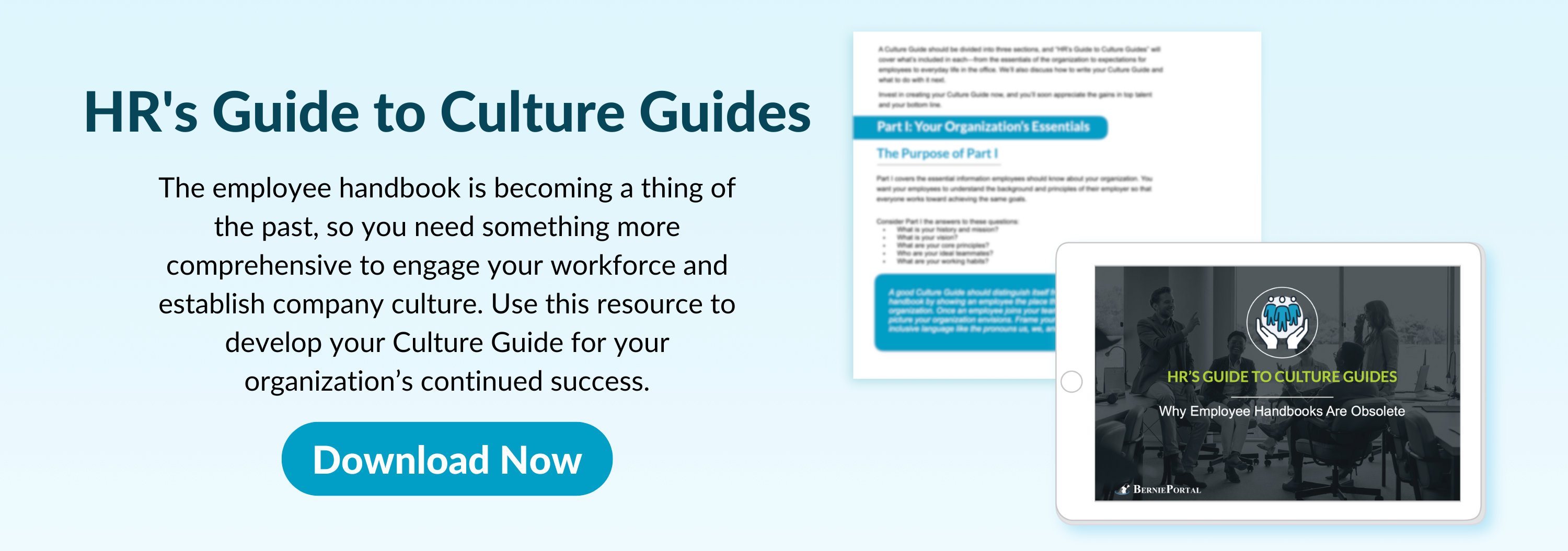Written by
Will Miranne
Will is an aPHR-certified writer on the marketing team at BerniePortal. He writes about healthcare, human resources, and benefits.
Template: How to Ask the Right Interview Questions

Hiring new employees is a tricky task. In many ways, the current hiring market favors interviewees—But you are still looking for the best candidate for your organization, and the easiest way of achieving this is by preparing the right questions.
A few well-formulated questions can help reveal a candidate's character and allow you to confidently move forward with the hiring process. Read on for the best interview questions for phone and face-to-face interviews, including what not to ask.
How to Conduct a Phone Interview
Phone interviews are a typical first step for many organizations. They are a way to gain an unbiased look at a candidate to see if there is interest in looking at them more closely for a position. The great thing about phone interviews is that because you can't see the person, it's easier to focus on the quality of what they're saying rather than other external factors unrelated to their job, like their appearance or nervousness.
With this in mind, treat the phone interview as an essential screen. Appreciate that with this interview, you are immune to the infamous "three-minute rule," where the interviewer forms the opinion within the first three minutes after seeing the person and uses the rest of the time to support it.
BerniePortal uses a three-step format for all phone interviews:
-
Candidate's Introduction (~10 minutes)
-
Bernard's Introduction (~10 minutes)
-
Q&A (~10 minutes)
Here's (generally) how the phone interview should go:
Hiring Manager: Hi [Candidate Name], I’m [Name], the hiring manager for the [open position'. We've emailed back and forth a little bit, but it's nice to connect with you over the phone. I have 30 minutes scheduled for this call, and I'd like to break it up into three sets of ten minutes. Is that OK with you?
Candidate: Sure.
Hiring Manager: Great. For the first few minutes, I'd like you to tell me about yourself. If you want to hit the highlights on your resume, or if there's something you didn't put on it that you'd like me to know, take this ten minutes to tell me. I'd like to spend the next ten minutes telling you about BerniePortal and, more specifically, about the role. Then, depending on where the conversation takes us, I'll spend the last ten minutes answering any questions you might have for me. So let's get started. Tell me a little bit more about yourself.
If the conversation doesn't flow, be prepared to facilitate it by asking questions about pivotal points in the candidate's life. Examples:
-
Why did you choose that school?
-
Why did you decide to move?
-
Why did you decide to leave that job?
Using these questions, you should be able to decide if you’d like to bring the candidate in for an in-person interview.
How to Conduct a Face-to-Face Interview
When preparing for an in-person interview, it is crucial that the space be well-curated and in good order. As you are likely interviewing multiple candidates, the candidate is likely interviewing with various organizations. Be sure the area is comfortable and set up to make a great first impression. An organization's space and feel can significantly impact the candidate's overall feelings about the job.
-
When the candidate arrives, greet them at the door, ask if they'd like coffee or water, and take them to the interview room.
-
Start with small talk. Here is an excellent two-pager where Ben Stein explains the art of having a business conversation. Ask what they like to do for fun and whether they follow a sport. Let them talk about themselves for about five minutes, and show genuine interest to facilitate a relaxed atmosphere.
-
From here, proceed with asking them about their understanding of the job. This will act as a natural segue into the actual interview.
-
After gauging their current understanding of the role, move on to their resume. The conversation can include a walkthrough from point to point. Be sure to look out for three important aspects of the candidate's personality:
-
Whether they get things done
-
Whether they have a passion
-
How they make decisions
Some other general questions to ask throughout the process can include:
-
Why did you choose that university?
-
In past roles, what are some of your proudest achievements?
-
Can you provide a few examples of mistakes you've made and how you solved them or how you'd do things differently now?
-
What did you enjoy the most and least about your previous roles?
-
If I were to ask your boss or coworkers about you, how would they describe you?
How to Use the STAR Method for Additional Questions
Another technique to incorporate is behavioral questions. You likely already have a good idea of what you're looking for in a candidate—a positive attitude, adaptability, good attention to detail, strong communication skills, etc.—but you can't always discern those things from a resume or even a general interview. A more reliable way to assess these qualities is by examining a candidate's past behavior through a behavioral interview.
A behavioral interviewing method, STAR stands for "situation, task, action, and results." Here are a few important notes regarding STAR questions:
-
They are built around a specific, real-world situation.
-
They identify a particular task the candidate had to accomplish.
-
They elicit information about the action the candidate took in response to the task.
-
They uncover details about the results of the candidate's action.
For best results, any behavioral interviewing process needs to be standardized. Ask the same questions to all applicants to reduce bias. To build a set of STAR questions for a role, start by identifying the core competencies you are looking for a candidate to have. Then, you can craft questions that ask the candidate to share experiences that specifically illustrate those competencies.
Ultimately, behavioral interviewing gives you more context and nuance about each candidate, and a standardized system of STAR questions and ratings allows you to conduct more insightful interviews. The more specific you can get with candidates' real-life experiences, the more accurately you can determine whether they have the necessary skills to help your organization move forward.
Questions Interviewers Shouldn't Ask
Stay away from any illegal or discriminating questions. This can include asking about gender, religion, national origin, ethnicity, or race. Employers also can't ask about pregnancy or childbirth, such as if a candidate plans on having children.
The EEOC has several guidelines on what is and is not an acceptable question during an interview. These include questions about:
-
A candidate's disability
-
Medications that a candidate may be taking
-
Current or previous worker's compensation claims
Not only are these inappropriate and illegal, but they also convey to a candidate that your organization is ill-prepared and possibly operating under a shaky culture. Any good prospect would run—and fast.
Questions Candidates May Ask
While you shouldn't expect candidates to turn their job interview into an interview of you or the company, great candidates tend to arrive prepared with a few questions about the role and culture of the company. A few notable, general questions candidates may ask could include:
- What would a normal day on the job look like for the person in this role?
- What's the work-life balance at your organization?
- Why did the person previously in this position leave the company or change roles?
- What's the culture like at your organization?
- What are the next steps after this interview?
Additionally, there are a few red flags that interviews may want to have top of mind when conducting job searches, including arriving late to the meeting, vague answers about past jobs, and generally being unaware of the company or the role.
Additional Resources
You can also stay informed, educated, and up-to-date with interview tips and other important topics by using BerniePortal’s comprehensive resources:
-
BerniePortal Blog—a one-stop-shop for HR industry news
-
HR Glossary—featuring the most common HR terms, acronyms, and compliance
-
HR Guides—essential pillars, covering an extensive list of comprehensive HR topics
-
BernieU—free online HR courses, approved for SHRM and HRCI recertification credit
- HR Party of One—our popular YouTube series and podcast, covering emerging HR trends and enduring HR topics

Written by
Will Miranne
Will is an aPHR-certified writer on the marketing team at BerniePortal. He writes about healthcare, human resources, and benefits.
Related Posts
Yes, you can use a health savings account, or HSA, for cosmetic surgery, but only in...
According to the KPMG 2023 CEO Outlook, 64% of business leaders believe there will be a...
Thomas J. Peters, best known for his book In Search of Excellence, once stated, “The day...
According to the Ethics and Compliance Initiative’s (ECI) 2023 Global Business Ethics...






Submit a Comment